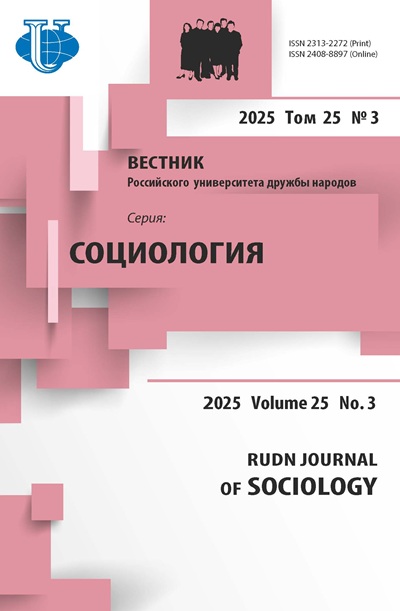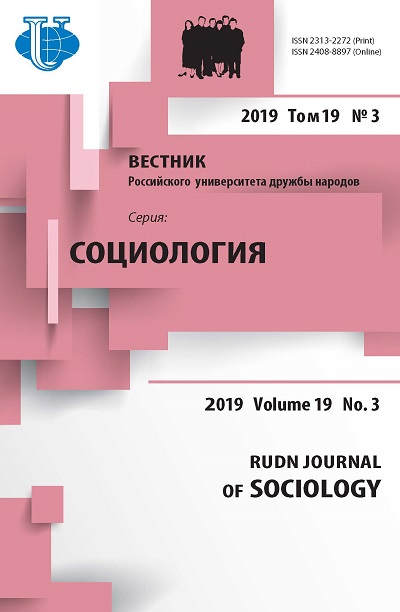Социология в движении: востребованность гуманистического цифрового поворота
- Авторы: Кравченко С.А.1,2
-
Учреждения:
- Московский государственный институт международных отношений (Университет) Министерства иностранных дел России
- Федеральный научно-исследовательский социологический центр Российской академии наук
- Выпуск: Том 19, № 3 (2019)
- Страницы: 397-405
- Раздел: Вопросы истории, теории и методологии
- URL: https://journals.rudn.ru/sociology/article/view/21675
- DOI: https://doi.org/10.22363/2313-2272-2019-19-3-397-405
- ID: 21675
Цитировать
Полный текст
Аннотация
Цифровизация социума имеет амбивалентные последствия: появились новые достижения («умные» технологии, искусственный интеллект, доступ к разнообразному знанию), однако возникли и цифровые риски и метаморфозы, травмирующие человеческий дух, поведение и мышления людей, высвобождая их из контекста социальных связей и жизненных миров. Данный процесс стал вызовом для социологии и других наук - разрабатываются новые подходы, среди которых цифровой и гуманистический повороты. Автор анализирует воздействие цифровизации на социум и человека (производство метаморфоз и побочных эффектов, порождающих новые сложные риски), разрабатывает контуры концепции «цифрового поворота в социологии», показывая его суть в сравнении с более ранними методологическими поворотами (лингвистическим, рискологическим, культурным и пр.), предлагает средства, позволяющие минимизировать побочный ущерб реализуемого сегодня типа цифровизации, - в частности, развитие социологии в направлении интеграции ресурсов цифрового и гуманистического поворотов. В статье утверждается, что новые вызовы человечеству и научному знанию проистекают не столько из самого процесса цифровизации, сколько от его нынешнего типа - основанного на принципах формальной рациональности, прагматизма и меркантилизма, фактически игнорирующих жизненные миры людей. Данный тип цифровизации не является универсальным и может быть заменен на альтернативный гуманистический ее вариант. Чтобы начать переход к гуманистическому тренду развития цифровизации, ученым следует интегрировать теоретический инструментарий цифрового поворота с другими междисциплинарными подходами, в первую очередь, с гуманистическим поворотом.
Об авторах
Сергей Александрович Кравченко
Московский государственный институт международных отношений (Университет) Министерства иностранных дел России; Федеральный научно-исследовательский социологический центр Российской академии наук
Автор, ответственный за переписку.
Email: sociol7@yndex.ru
доктор философских наук, заведующий кафедрой социологии Московского государственного института международных отношений (Университета) Министерства иностранных дел России; главный научный сотрудник Федерального научно-исследовательского социологического центра Российской академии наук
просп. Вернадского, 76, Москва, 119454, Россия; ул. Кржижановского, 24/35, стр. 5, Москва, 117218, РоссияСписок литературы
- Anderson B. Imagined Communities: Reflections on the Origin and Spread of Nationalism. London: Verso; 1983.
- Beck U. World at Risk. Cambridge: Polity Press; 2010.
- Beck U. The Metamorphosis of the World. Cambridge: Polity Press; 2016.
- Beck U., Beck-Gernsheim E. Distant Love: Personal Life in the Global Age. Beck-Gernsheim; 2014.
- Braidotti R. The Posthuman. Cambridge: Polity Press; 2015.
- Bustillos J. The digital divide. Neoliberal imperatives and education. S. Isaacs (Ed.). European Social Problems. London - New York: Routledge; 2017.
- Castells M. (Ed.) Another Economy is Possible. Cambridge: Polity Press; 2017.
- Castells M. The Rise of the Network Society. Oxford: Wiley-Blackwell; 2010.
- Elliott A., Urry J. Mobile Lives. New York: Routledge; 2010.
- Goffman E. Stigma: Notes on the Management of Spoiled Identity. New York: Simon and Schuster; 1963.
- Goffman E. On cooling the mark out: Some aspects of adaptation to failure. Psychiatry. 1952; 15 (4).
- Kravchenko S.A. Sociology on the move to interaction of theoretical and methodological approaches. Sotsiologicheskie Issledovania. 2011; 1 (In Russ.).
- Kravchenko S.A. Becoming complex social reality: Issues of vulnerabilities. Sotsiologicheskie Issledovania. 2013; 5 (In Russ.).
- Kravchenko S.A. ‘A normal anomie’: Contours of conception. Sotsiologicheskie Issledovania. 2014; 8 (In Russ.).
- Kravchenko S.A. Metamorphoses: Essence, increasingly complex types, place in sociology of knowledge. Sotsiologicheskie Issledovania. 2017; 10 (In Russ.).
- Kravchenko S.A. The coexistence of riskophobia and riskophilia - an expression of ‘normal anomie’. Sotsiologicheskie Issledovania. 2017; 2 (In Russ.).
- Kravchenko S.A., Perova A.E. ‘New catastrophism’ and the future: The demand for non-linear knowledge. RUDN Journal of Sociology. 2014; 17 (4).
- Marres N. Digital Sociology. The Reinvention of Social Research. Cambridge: Polity Press; 2017.
- Mosco V. Becoming Digital. Toward a Post-Internet Society. Bingley: Emerald Publishing Limited; 2017.
- Perrow Ch. Normal Accidents: Living with High Risk Technologies. New Brunswick: Rutgers University Press; 1999.
- Perrow Ch. The Next Catastrophe: Reducing our Vulnerabilities to Natural, Industrial, and Terrorist Disasters. Princeton University Press; 2011.
- Prigogine I. The End of Certainty. New York: Free Press; 1997.
- Urry J. Climate Change and Society. Malden: Polity Press; 2011.
- Vanderburg W.H. Our Battler for the Human Spirit: Scientific Knowing, Technical Doing, and Daily Living. Toronto: University of Toronto Press; 2016.
Дополнительные файлы













